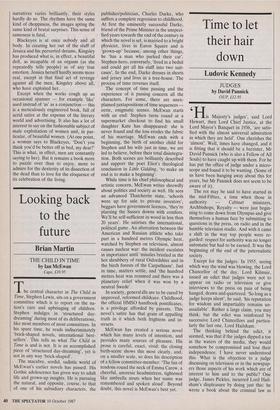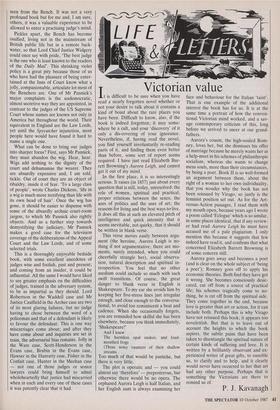Time to let their hair down
Ludovic Kennedy
JUDGES by David Pannick OUP, £12.95 is Majesty's judges', said Lord Hewart, then Lord Chief Justice, at the Lord Mayor's Banquet in 1936, 'are satis- fied with the almost universal admiration in which they are held'. One cherishes the 'almost'. Well, times have changed, and it is fitting that it should be a barrister, Mr David Pannick (who is also a Fellow of All Souls) to have caught up with them. For he has put the office of judge under a micro- scope and found it to be wanting. (Some of us have been banging away about this for years, but Mr Pannick does not seem to be aware of it).
The rot may be said to have started in the mid-Fifties, a time when those in authority — Cabinet ministers, Archbishops, Royalty — were just begin- ning to come down from Olympus and give themselves a human face by submitting to questions in the press, on radio and in the humble television studio. And with it came a shift in the way top people were re- garded: respect for authority was no longer automatic but had to be earned. It was the beginning of the end of the paternalistic society.
Except for the judges. In 1955, seeing which way the wind was blowing, the Lord Chancellor of the day, Lord Kilmuir, issued an edict that judges were not to appear on radio or television or give interviews to the press on pain of being hanged, drawn and quartered. `So long as a judge keeps silent', he said, 'his reputation for wisdom and impartiality remains un- assailable'. Rather a large claim, you may think; but the edict was reinforced by successive Lord Chancellors and particu- larly the last one, Lord Hailsham.
The thinking behind the edict, it seemed, was that if the judges dipped a toe in the waters of the media, they would somehow be compromised and lose their independence. I have never understood this. What is the objection to a judge discussing on television or in the newspap- ers those aspects of his work which are of interest to him and to the public? One judge, James Pickles, incurred Lord Hail- sham's displeasure by doing just this: he wrote a book about the criminal law as seen from the Bench. It was not a very profound book but for me and, I am sure, others, it was a valuable experience to be allowed to enter a practising judge's mind.
Pickles apart, the Bench has become ossified, living not in the mainstream of British public life but in a remote back- water, so that Lord Chief Justice Widgery could once say with pride, 'The best judge is the one who is least known to the readers of the Daily Mail'. This shrinking violet policy is a great pity because those of us who have had the pleasure of being enter- tained at the Inns of Court know what a jolly, companionable, articulate lot most of the Benchers are. One of Mr Pannick's major complaints is the undemocratic, almost secretive way they are appointed, in contrast to the judges of the US Supreme Court whose names are known not only in America but throughout the world. Their equivalent in England are the Law Lords, yet until the Spycatcher injunction, most people here would have found it hard to name a single one.
What can be done to bring our judges into sharper focus? First, says Mr Pannick, they must abandon the wig. Hear, hear. Wigs add nothing to the dignity of the court and dehumanise the wearer. They are absurdly expensive and, I am told, tickle. Out of court they are an object of ribaldry, inside it of fear. 'To a large class of people', wrote Charles Dickens, 'life in a wig is much more terrifying than life with its own head of hair'. Once the wig has gone, it should be easier to dispense with some of the absurdly archaic court-room jargon, to which Mr Pannick also rightly objects. And as a further step towards demystifying the judiciary, Mr Pannick makes a good case for the television coverage of the deliberations of the Appeal Court and the Law Lords, and of some selected trials.
This is a thoroughly enjoyable bedside book, with some excellent anecdotes of judges wise and foolish, past and present; and coming from an insider, it could be influential. All the same I would have liked to see greater emphasis on the difficulties of judges, trained in the adversary system, to be as impartial as they should. Lord Robertson in the Waddell case and Mr Justice Caulfield in the Archer case are two of its most glaring failures, but no judge having to chose between the word of a policeman and that of a defendant is likely to favour the defendant. This is one way miscarriages come about; and after they have come about and inquiries are set in train, the adversarial bias remains. Jolly in the Ware case, Scott-Henderson in the Evans case, Brabin in the Evans case, Hawser in the Hanratty case, Fisher in the Confait case, Hunter in the Meehan case — not one of those judges or senior lawyers could bring himself to admit wholeheartedly that justice had miscarried when in each and every one of these cases it was patently clear that it had.



























































 Previous page
Previous page